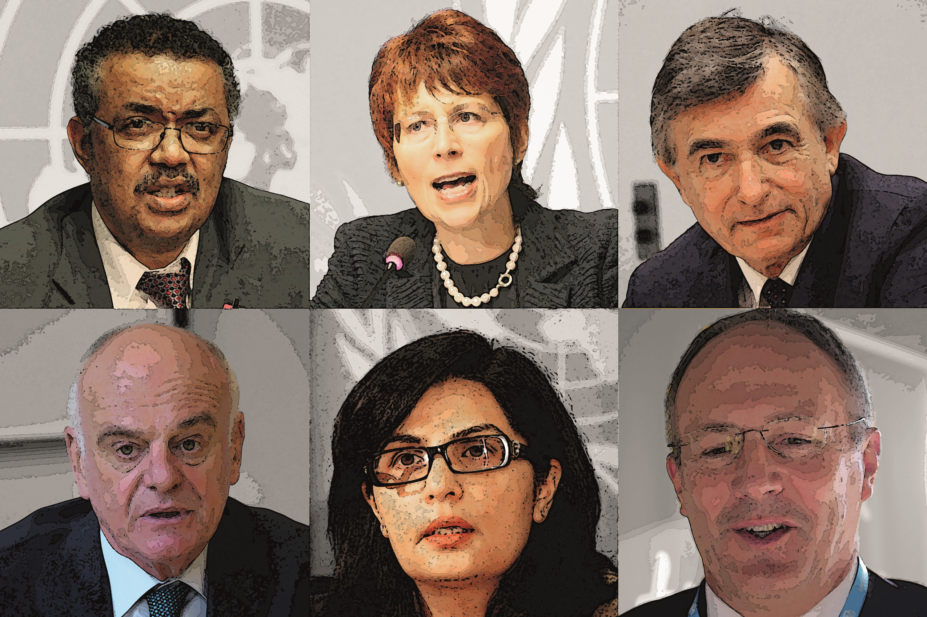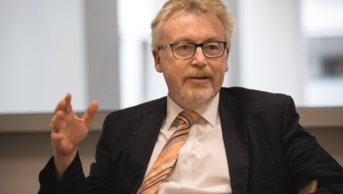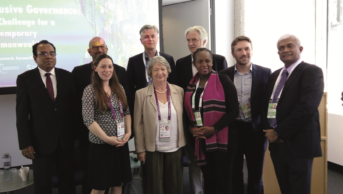
John Zarocostas
In January 2017, the World Health Organization’s (WHO) 34-member country executive board will draw up a shortlist of up to five candidates from the six health experts proposed by member states. Four are from Europe, one is from Africa and one from Asia. Board members will then interview each of the five candidates and subsequently nominate up to three names to be put before the World Health Assembly in May 2017, which will then elect the new director-general by secret ballot. The new chief is expected to take the helm at the WHO on 1 July 2017. Below, the six candidates discuss their priorities and vision for the role.
Ethopia: Tedros Adhanom Ghebreyesus (TAG), 51, is a former minister of health (2005–2012) and minister of foreign affairs (2012–2016) in Ethiopia. He holds a PhD in community health (University of Nottingham) and an MSc in immunology of infectious diseases (University of London). He was board chair of the Global Fund to Fight AIDS, Tuberculosis and Malaria (2009–2011), and served as chair of the Roll Back Malaria Partnership and the UNAIDS Programme Coordination Board.
Italy: Flavia Bustreo (FB), 55, has been the WHO assistant director-general for family, women’s and children’s health since October 2010, and is also vice-chair of Gavi, the Vaccine Alliance. During 2009–2011, she was director of the Partnership for Maternal Newborn and Child Health (PMNCH). She holds a degree in medicine and surgery from the University of Padua, and an MSc in communicable disease epidemiology from the London School of Hygiene and Tropical Medicine.
France: Philippe Douste-Blazy (PD-B), 63, is a cardiologist and professor of medicine. He is a former French minister of health (1993–1995, 2004–2005) and minister of foreign affairs (2005–2007). Since 2008, he has been under-secretary-general and special adviser to the United Nations’ secretary-general on innovative financing for development. He is also a founding member of UNITAID, a global health initiative in part financed by a solidarity levy on airline tickets, and chair of its executive board (2007–2016).
UK: David Nabarro (DN), 67, is a physician and a former senior WHO official. He is special adviser to the UN secretary-general on the 2030 Agenda for Sustainable Development and Climate Change, was UN special envoy on Ebola (2014–2015), and chair of the Advisory Group on Reform of the WHO’s work in Outbreaks and Emergencies (2015–2016). From 1990–1999, he was chief health and population adviser at the UK Department for International Development.
Pakistan: Sania Nishtar (SN), 53, is a trained cardiologist, a former minister of health (2013), founder and president of Heartfile, a non-profit think tank on healthcare reform, and co-chair of the WHO Commission on Ending Childhood Obesity (2014–present). She served as chair of the UN secretary-general’s Independent Accountability Panel for the Global Strategy for Women’s, Children’s and Adolescent’s Health (2015–2016).
Hungary: Miklós Szócska (MS), 56, is a trained physician and an associate professor and director of the Health Services Management Training Centre at Semmelweis University, Budapest. He served as minister of health (2010–2014) and, in 2015, he was the WHO Expert Advisory Group member on reviewing the relevance and effectiveness of the WHO Global Code of Practice on the International Recruitment of Health Personnel.
What would be your core priorities for global public health as WHO director-general?
TAG: If elected, I will focus on five main priorities. First, I will build the WHO into a more effective, transparent and accountable agency that is independent, science- and innovation-based, results-focused, and responsive. Second, I will advance universal health coverage to ensure that everyone can access the health services they need without risk of impoverishment. Third, I will increase health security by strengthening the capacity of national authorities and local communities to detect, prevent and manage health emergencies. Fourth, I will put the health and well-being of women, children and adolescents at the centre of the global health and development agendas. And finally, I will support national health authorities to better understand and address the effects of climate and environmental change on health.
FB: If we are serious about achieving sustainable development goals (a set of 17 aspirational global goals, with 169 targets between them), we need to address health as a cross-cutting driver of sustainable development, enhancing policies in other sectors that are crucial determinants of health, for example, education, energy, water, sanitation and infrastructure. We urgently need to make universal health coverage a reality by greatly expanding the number of people with access to healthcare, as well as adding critical services that are currently unavailable in many low-income countries, especially for non-communicable diseases.
We must drive the reform of the WHO in health emergencies, outbreaks and other humanitarian crises, and strengthen global health security, taking into account the International Health Regulations framework and reinforcing surveillance for new threats such as antimicrobial resistance and the Zika virus. It is crucial to address the impact of climate change on health and well-being, which requires addressing its impact on disease vectors, food security, safe water, clean air, etc.
We need to prioritise the health of women, children and young people in all settings, and address the impact of migration and fragile health systems.
Overall, my leadership will be founded on principles of equity, rights, responsiveness, evidence and partnership.
PD-B: The WHO must be strengthened in its leadership in global public health. Its function is to issue guidelines and recommendations to protect health at a global level. It has to reaffirm the principles of the 1978 Alma-Ata Declaration (which identified primary healthcare as the key to the attainment of the goal of health for all) by underlining the significance of universal health coverage. This is the only way to reduce inequalities and maternal and child mortality, ensure that vulnerable populations (e.g. women, children and people living with HIV, mental illnesses or requiring palliative care, etc) can gain access to healthcare, and contribute to implementing the international health regulations. The WHO’s priorities must be routinely defined in accordance with their impact on the principal global health challenges. The development of a global vision of health priorities will provide a frame of reference for WHO’s activities and facilitate cohesion between the WHO and its member states.
DN: There are four areas of priority for me. First, the health sector must benefit from and contribute to universal realisation of the 2030 Agenda for Sustainable Development, including through universal health coverage for women, children, adolescents, people with non-communicable diseases and mental illness, disabled people, and other vulnerable populations. Second, national governments must ensure their people’s resilience in the face of infectious threats to health, through being able to depend on the WHO’s strategic leadership with regard to preparedness, detection, response and prevention. Third, policies and actions for health should reflect the needs of the society, champion the interests of healthcare workers and promote universal access to effective, efficient healthcare. And finally, people, civil society, scientists, businesses and government within WHO member states must benefit from the WHO as a catalyst and stimulus for everyone’s health through respectful, reliable, consistent, transparent and accountable partnering at national, regional and global levels.
SN: In terms of priorities for global public health, my vision outlines four areas: operational readiness in outbreaks and emergencies; strengthened action on global public goods; focus on supporting countries to reduce the health risks of climate change; and country-relevant support to achieve the sustainable development goals. I regard infectious outbreaks, antibiotic resistance and the silent pandemic of non-communicable diseases as the biggest immediate threats to the collective health of people worldwide. These, together with climate change, threaten to wipe out the development gains of the past century. It is also critical to address other more ‘individual-centric’ threats to health, such as widening health inequalities, poor coverage, lack of financial risk protection and poor quality of care. This creates a strong imperative for countries to adopt universal health coverage as a policy goal, given its cross-cutting potential to address both sets of challenges.
My vision for the WHO is centred on ten pledges for action, six of which are focused on reclaiming the WHO’s primacy. I have therefore pledged to institutionalise accountability and transparency, ensure value for money, and drive a culture based on results and concrete delivery. I pledge to focus the WHO on its core mandates and to exercise the WHO’s leadership through effective coordination, building on comparative advantage and establishing a partnership-fostering culture.
MS: Health should be available and accessible for everyone. One unified aim should be arranged. However, different solutions should be applied in different cases based on cultural, social, religious and economical differences. Citizens should also be responsible for their own health. However, we should not forget to provide support to help people become responsible and more aware of their health and well-being. We need agile preparedness against pandemics and communicable disease and tailored interventions against one of the biggest killers, non-communicable diseases.
How would you enhance access to life-saving medicines and vaccines for communicable and non-communicable diseases?
TAG: Expanding access to medicines must be a priority for the next director-general. Too many people — particularly in low-income and middle-income countries — cannot access the healthcare services they need. We must work with industry, regulatory authorities and other stakeholders on ways to make both old and cutting-edge medicines and vaccines more accessible and affordable. We need to focus on non-communicable diseases, which is a growing burden, using the tried and tested low-cost, high-volume model. Beyond pricing, we must also support low-income countries’ efforts to enhance their service delivery systems to ensure that safe, effective medicines and vaccines reach those who need them most, including in hard-to-reach areas such as rural and crisis settings. The WHO can support local manufacturing through capacity building on technical support, HR development, and supporting regulatory systems. Identifying and scaling up best practices will improve pre-qualification for manufacturers and address barriers to access.
FB: The WHO should play a critical role in enhancing access to life-saving medicines and vaccines for communicable and non-communicable diseases through collective international action with member states and multi-stakeholder partners. It must use the best available scientific evidence, provide advocacy and policy support to leverage resources and inform investment, and promote research and innovation. We need to develop better context-specific approaches to support country implementation and promote a more people-centred approach to health.
As co-chair of Gavi, the Vaccine Alliance, I engaged with innovative mechanisms such as advanced market commitments and social bonds to promote access. I also worked closely with the UN Commission on Life-Saving Commodities for Women and Children, which initially prioritised a few low-cost, evidence-based commodities, such as oxytocin and magnesium sulfate, to develop innovative ways to scale-up access and save lives. These experiences provide a foundation for my leadership on these issues.
PD-B: As head of UNITAID, I was the first to use market dynamics to lower the price of medicines for HIV, tuberculosis and malaria. With the UNITAID executive board, I also set up the medicines patent pool, which enabled the poorest people living with HIV/AIDS to have access to the same medicines as the richest. The sustainable development goals show to what extent universal access to essential medicines and vaccines is an essential component of the right to health. If elected, I pledge to implement the recommendations of high-level panel on access to medicines convened by the secretary general of the UN. My priorities would include: promoting access to new products; encouraging manufacturers to continue to produce older essential medicines and strengthening national governance in this area; and developing a mechanism to monitor global policies in the area of essential medicines.
DN: I will address the challenge through detailed briefing from relevant staff within the WHO and continuous dialogue with representatives of member states and other stakeholders as appropriate. Access to essential medicines and vaccines is now explicitly recognised under target 3.8 of the sustainable development goals. This is an area where the WHO has traditionally had a comparative advantage, and I am committed that it will remain so. The specific strategies that I would expect to explore include: sustaining the momentum that has created the research and development blueprint for action to prevent epidemics (which is already showing its impact in relation to the Zika outbreak); building on the work of the UN High Level Panel on Access to Medicines; ensuring that investment in life-saving commodities is justified through better tracking of changes in access; increasing focus on the “network effects” of the WHO’s normative work; extending price monitoring; and maintaining continuous dialogue with drug manufacturers.
SN: I will ensure the WHO advocates for and helps countries increase access through the right policies and practices and by strengthening their regulatory systems. Strong and effective healthcare systems play a major role in ensuring access to medicines. Second, I will ensure that the WHO fulfils its global roles effectively in relation to access to medicines — norms and standard setting, safety and vigilance, international regulatory oversight and surveillance in relation to medical products, catalysing increased research and development for neglected diseases of poverty, particularly those with market failures, price surveillance, and combatting antimicrobial resistance and innovations to ensure availability of new and effective essential medicines at affordable prices. The biggest shortfalls at present in all countries include the affordability issue and fiscal constraints in relation to research and development.
MS: In the past few years we have been facing shortcomings in the field of many life-saving medicines, such as basic antibiotics, vaccines or oncology products. This causes significant public health risks and increases prices further, thereby worsening access for low-income and middle-income countries and those countries that have limited pharmaceutical capacities. As past minister of state for health in Hungary I needed to solve the same problem. By bearing in mind the most fundamental principle — providing continuous and appropriate treatment — I identified the following steps to overcome the difficulties: exploring the reasons, designing warning and forecasting systems, and establishing risk-sharing models. The WHO should focus on supporting such coordinative function and the utilisation of new supply models.


